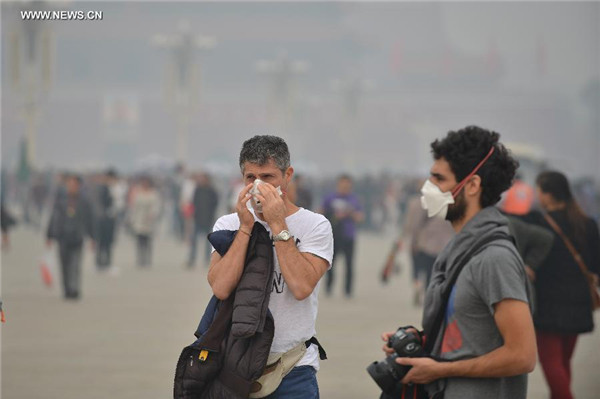Jokes, air purifiers: life of Beijingers in days of smog
 0 Comment(s)
0 Comment(s) Print
Print E-mail Xinhua, October 10, 2014
E-mail Xinhua, October 10, 2014
"The longest distance in the world is not that between life and death, but when I hold your hand at a crossing in Beijing, I can't see your face."
As with many of the country's more solemn situations, the choking smog blanketing Beijing since Monday has evoked such wisecracks from social media users making light of the dire air situation.
 |
|
A foreign tourist (L) adjusts his mask as visiting the smog-shrouded Tian'anmen Square in Beijing, capital of China, Oct. 9, 2014. [Photo/Xinhua] |
In the past few days, jokes on the topic have become one of the most discussed threads on China's largest microblogging site Sina Weibo.
But despite the light-hearted approach to the pernicious atmosphere, the capital's residents are feeling the impact of what is the most severe bout of smog in Beijing since July.
The National Meteorological Center (NMC) upgraded Tuesday's yellow alert to orange, the second highest, on Thursday afternoon. It suggested people stay indoors and wear masks if going out.
Dou Chen returned from the UK to China this February. Since coming home, she has suffered from a nettle rash for five months. A blood test found that she is allergic to substances in the air.
"When I travel outside Beijing, my symptoms are relieved," she said. But in the past two days, the rash worsened.
In the Guang'anmen Hospital, a doctor told her the symptom were affected by the smog.
An unnamed staff member with the Beijing Children's Hospital told Xinhua although they haven't seen an obvious rise of patient numbers yet because the smog just started, they were told to prepare for a peak in respiratory problems.
Wang Xia, 34, is a teacher with the No. 25 Middle School. "Whenever persistent smog occurs, more students ask for sick leave," she said. "In a class with about 40, once more than 10 students left in the afternoon."
The environment watchdog in Beijing blamed farmers' burning fields of straw for causing the smog, an allegation doubted by Beijingers.
But Li Lixin, an air pollution treatment official with the Beijing Environmental Protection Bureau, said a satellite test conducted during the summer of 2013 showed a discharge from widespread straw fires could drive up the PM 2.5 reading in Beijing from 110 to 460 micrograms per cubic meter in a few hours.
Still, web users question the charge.
"Agriculture has been a vital industry in China for hundreds, if not thousands, of years, and it is the tradition in rural areas to burn straw after autumn harvest and plough to bury the ashes in the ground as fertilizer," said a Weibo user nicknamed Sunflower. "But why we didn't have smog in the past?"






Go to Forum >>0 Comment(s)